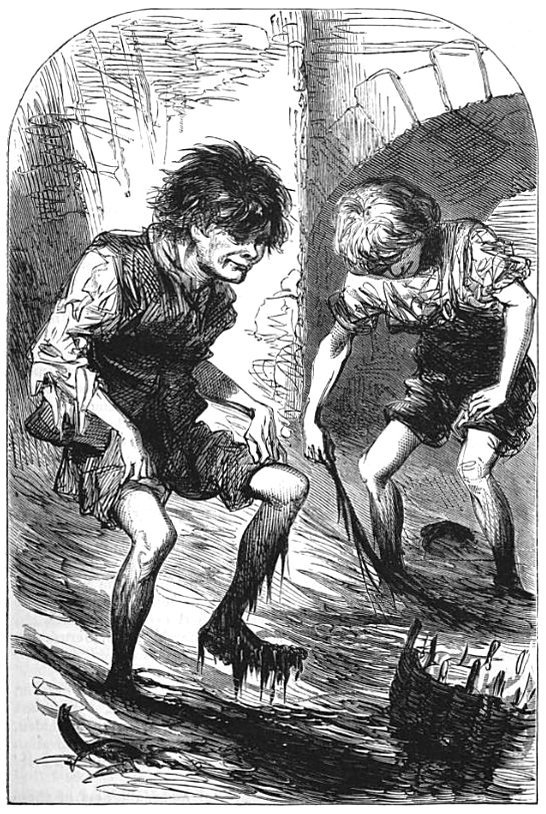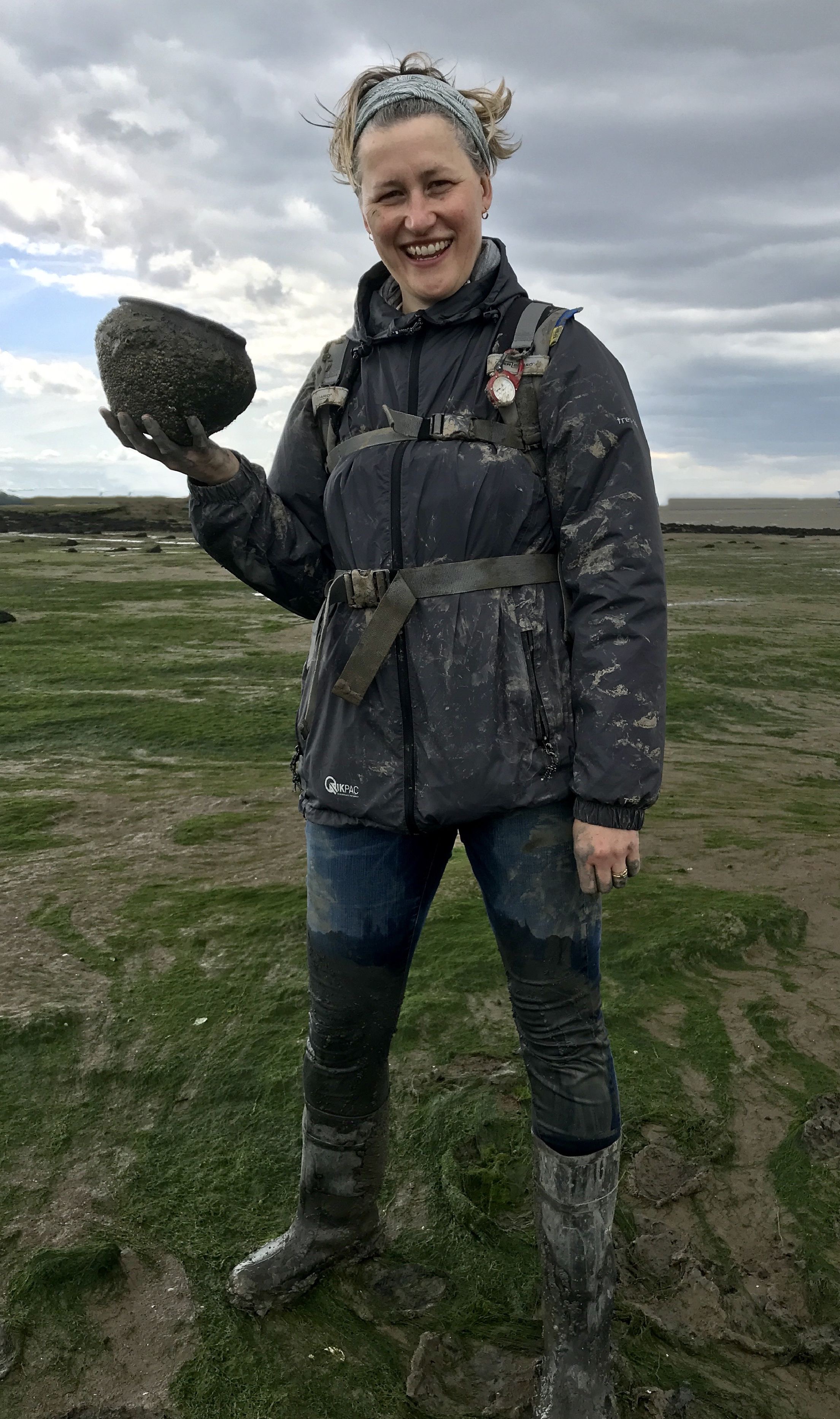|
Mudlark
A mudlark is someone who scavenges in river mud for items of value, a term used especially to describe those who scavenged this way in London during the late 18th and 19th centuries. The practice of searching the banks of rivers for items continues in the modern era, with newer technology such as metal detectors sometimes being employed to search for metal valuables that may have washed ashore. Mudlarks in the 18th and 19th centuries Mudlarks would search the muddy shores of the River Thames at low tide for anything that could be sold – sometimes, when occasion arose, pilfering from river traffic as well. By at least the late 18th century, people dwelling near the river could scrape a subsistence living this way. Mudlarks were usually either youngsters aged between 8 and 15, or the robust elderly, and though most mudlarks were male, girls and women were also scavengers.Henry Mayhew, ''London Labour and the London Poor; Extra Volume'' 1861 Becoming a mudlark was usually a c ... [...More Info...] [...Related Items...] OR: [Wikipedia] [Google] [Baidu] |
Lara Maiklem
Lara Maiklem FSA (born 1971) is a British author, editor and publishing consultant, known for her writing and speaking on mudlarking. She was elected a Fellow of the Society of Antiquaries of London in 2022. Personal life Maiklem grew up on a dairy farm in Surrey. She read sociology and social anthropology at Newcastle University before moving to London where she worked in publishing. She now lives with her partner and children on the Kent coast Mudlarking During her childhood Maiklem was fascinated by the past in the form of pottery shards, glass bottle stoppers, fossils and clay pipes, which she found in the garden and fields of the family’s farm. After moving to London she began to mudlark on the tidal banks of the River Thames where she scavenged for objects that had been lost and dropped into the river. Some of Maiklem’s most treasured discoveries are a Tudor shoe, a medieval pilgrim badge, a complete Iron Age pot, a Roman auxiliary soldier's sword scabbard chap ... [...More Info...] [...Related Items...] OR: [Wikipedia] [Google] [Baidu] |
London Labour And The London Poor
''London Labour and the London Poor'' is a work of Victorian journalism by Henry Mayhew. In the 1840s, he observed, documented and described the state of working people in London for a series of articles in a newspaper, the ''Morning Chronicle'', which were later compiled into book form. Mayhew went into deep, almost pedantic detail concerning the trades, habits, religion and domestic arrangements of the thousands of people working the streets of the city. Much of the material comprises detailed interviews in which people candidly describe their lives and work. For instance, Jack Black talks about his job as "rat and mole destroyer to Her Majesty" and remains in good humour despite his experience of a succession of near-fatal infections from bites.Jack Black, WikiSource Beyond that anecdotal material, Mayhew's articles are particularly notable for attempting to justify numerical estimates with other information, such as census data and police statistics. Thus, if the assertion is ... [...More Info...] [...Related Items...] OR: [Wikipedia] [Google] [Baidu] |
The Mudlark
''The Mudlark'' is a 1950 film made in Britain by 20th Century Fox. It is a fictional account of how Queen Victoria was eventually brought out of her mourning for her dead husband, Prince Albert. It was directed by Jean Negulesco, written and produced by Nunnally Johnson and based on the 1949 novel of the same name by American artillery sergeant and San Francisco newspaperman Theodore Bonnet (1908–1983). It stars Irene Dunne, Alec Guinness and Andrew Ray. " Mudlarks" were street children who survived by scavenging and selling what they could find on the banks of the River Thames. The film was a hit in Britain and made an overnight star of Andrew Ray, who played the title character. Plot A young street urchin named Wheeler, half-starved, homeless and an orphan, finds a cameo containing the likeness of Queen Victoria. Not recognising her, he is told that she is the "mother of all England". Taking the remark literally, he journeys to Windsor Castle to see her. He manages to sn ... [...More Info...] [...Related Items...] OR: [Wikipedia] [Google] [Baidu] |
Jack Shaftoe
Jack Shaftoe (also known, at various points, as King of the Vagabonds, ''L'Emmerdeur'', Half-Cocked Jack, Quicksilver, Ali Zaybak, Sword of Divine Fire, and Jack the Coiner) is one of the three primary fictional characters in Neal Stephenson's 2,686-page, Clarke Award-winning epic trilogy, ''The Baroque Cycle''. Born in 1660 to a poor London family, Jack, the youngest of three half-brothers, becomes a mudlark at the age of five, abandoning this then-common criminal enterprise shortly thereafter when his eldest half-brother Dick is drowned during a failed raid on a Dutch ''galjoot'' in the Thames. After several years working as an impromptu assistant to men about to be hanged by Jack Ketch from the Treble Tree in Tyburn, Jack leaves England to become a vagabond in continental Europe. Much of ''The Baroque Cycle'' concerns Jack's adventures in (among other ports-of-call) England, France, Germany, Austria, The Barbary Coast, Egypt, India, Japan, the Philippines, and Mexico between ... [...More Info...] [...Related Items...] OR: [Wikipedia] [Google] [Baidu] |
Waste Picker
A waste picker is a person who salvages reusable or recyclable materials thrown away by others to sell or for personal consumption. There are millions of waste pickers worldwide, predominantly in developing countries, but increasingly in post-industrial countries as well. Various forms of waste picking have been practiced since antiquity, but modern traditions of waste picking took root during industrialization in the nineteenth century. Over the past half-century, waste picking has expanded vastly in the developing world due to urbanization, toxic colonialism and the global waste trade. Many cities only provide solid waste collection. Terminology Many terms are used to refer to people who salvage recyclables from the waste stream for sale or personal consumption. In English, these terms include ''rag picker'', ''reclaimer'', ''informal resource recoverer'', ''binner'', ''recycler'', ''poacher'', ''salvager'', ''scavenger'', and ''waste picker''; in Spanish ''cartonero'', ''ch ... [...More Info...] [...Related Items...] OR: [Wikipedia] [Google] [Baidu] |
Poor Jack
''Poor Jack'' is a novel by the English author Frederick Marryat, published in 1840. It tells the story of Thomas Saunders, a sailor's son and neglected street urchin struggling to survive in Greenwich, London in the early 19th century. ("Poor Jack" was the title given by the waterfront boys, or mudlarks, to their chief.) In a rags-to-riches story Saunders eventually rises by his own efforts to become a pilot on the Thames, makes his fortune and retires to the life of a wealthy squire. The novel has interesting descriptions of domestic life among the naval lower ranks and contains many anecdotes of seafaring life. External links * Poor Jack' at Project Gutenberg Project Gutenberg (PG) is a Virtual volunteering, volunteer effort to digitize and archive cultural works, as well as to "encourage the creation and distribution of eBooks." It was founded in 1971 by American writer Michael S. Hart and is the ... 1840 British novels English novels 1840s children's boo ... [...More Info...] [...Related Items...] OR: [Wikipedia] [Google] [Baidu] |
Thames Mudlarking (3152095659)
The River Thames ( ), known alternatively in parts as the River Isis, is a river that flows through southern England including London. At , it is the longest river entirely in England and the second-longest in the United Kingdom, after the River Severn. The river rises at Thames Head in Gloucestershire, and flows into the North Sea near Tilbury, Essex and Gravesend, Kent, via the Thames Estuary. From the west it flows through Oxford (where it is sometimes called the Isis), Reading, Henley-on-Thames and Windsor. The Thames also drains the whole of Greater London. In August 2022, the source of the river moved five miles to beyond Somerford Keynes due to the heatwave in July 2022. The lower reaches of the river are called the Tideway, derived from its long tidal reach up to Teddington Lock. Its tidal section includes most of its London stretch and has a rise and fall of . From Oxford to the Estuary the Thames drops by 55 metres. Running through some of the drier parts of ... [...More Info...] [...Related Items...] OR: [Wikipedia] [Google] [Baidu] |
Henry Mayhew
Henry Mayhew (25 November 1812 – 25 July 1887) was an English journalist, playwright, and advocate of reform. He was one of the co-founders of the satirical magazine ''Punch'' in 1841, and was the magazine's joint editor, with Mark Lemon, in its early days. He is also known for his work as a social researcher, publishing an extensive series of newspaper articles in the '' Morning Chronicle'' that was later compiled into the book series ''London Labour and the London Poor'' (1851), a groundbreaking and influential survey of the city's poor. Biography Early life He was born in London, the thirteenth of 17 children of Joshua Mayhew. He was educated at Westminster School before running away from his studies to sea. He then served with the East India Company as a midshipman on a ship bound for Calcutta. He returned after several years, in 1829, becoming a trainee lawyer in Wales.Taithe (1996), p. 9 He left this and became a freelance journalist. He contributed to ''The Thief'', ... [...More Info...] [...Related Items...] OR: [Wikipedia] [Google] [Baidu] |
River Thames
The River Thames ( ), known alternatively in parts as the River Isis, is a river that flows through southern England including London. At , it is the longest river entirely in England and the second-longest in the United Kingdom, after the River Severn. The river rises at Thames Head in Gloucestershire, and flows into the North Sea near Tilbury, Essex and Gravesend, Kent, via the Thames Estuary. From the west it flows through Oxford (where it is sometimes called the Isis), Reading, Henley-on-Thames and Windsor. The Thames also drains the whole of Greater London. In August 2022, the source of the river moved five miles to beyond Somerford Keynes due to the heatwave in July 2022. The lower reaches of the river are called the Tideway, derived from its long tidal reach up to Teddington Lock. Its tidal section includes most of its London stretch and has a rise and fall of . From Oxford to the Estuary the Thames drops by 55 metres. Running through some of the drier ... [...More Info...] [...Related Items...] OR: [Wikipedia] [Google] [Baidu] |
Metal Detectors
A metal detector is an instrument that detects the nearby presence of metal. Metal detectors are useful for finding metal objects on the surface, underground, and under water. The unit itself, consist of a control box, and an adjustable shaft, which holds a pickup coil, which can vary in shape and size. If the pickup coil comes near a piece of metal, the control box will register its presence by a changing tone, a flashing light, and or by a needle moving on an indicator. Usually the device gives some indication of distance; the closer the metal is, the higher the tone in the earphone or the higher the needle goes. Another common type are stationary "walk through" metal detectors used at access points in prisons, courthouses, airports and psychiatric hospitals to detect concealed metal weapons on a person's body. The simplest form of a metal detector consists of an oscillator producing an alternating current that passes through a coil producing an alternating magnetic field. ... [...More Info...] [...Related Items...] OR: [Wikipedia] [Google] [Baidu] |




